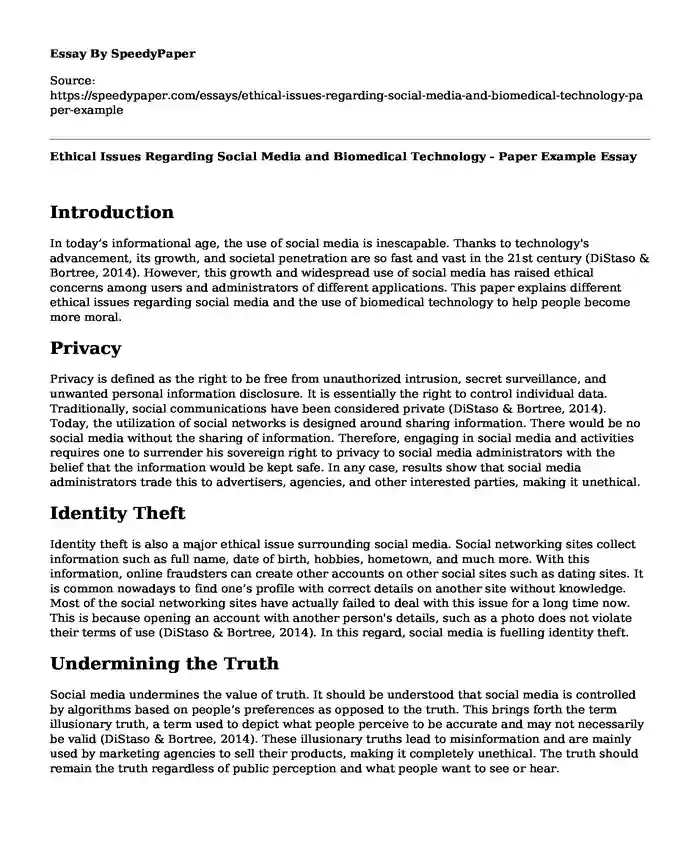
| Type of paper: | Essay |
| Categories: | Medicine Technology Ethics Social media |
| Pages: | 3 |
| Wordcount: | 744 words |
Introduction
In today’s informational age, the use of social media is inescapable. Thanks to technology's advancement, its growth, and societal penetration are so fast and vast in the 21st century (DiStaso & Bortree, 2014). However, this growth and widespread use of social media has raised ethical concerns among users and administrators of different applications. This paper explains different ethical issues regarding social media and the use of biomedical technology to help people become more moral.
Privacy
Privacy is defined as the right to be free from unauthorized intrusion, secret surveillance, and unwanted personal information disclosure. It is essentially the right to control individual data. Traditionally, social communications have been considered private (DiStaso & Bortree, 2014). Today, the utilization of social networks is designed around sharing information. There would be no social media without the sharing of information. Therefore, engaging in social media and activities requires one to surrender his sovereign right to privacy to social media administrators with the belief that the information would be kept safe. In any case, results show that social media administrators trade this to advertisers, agencies, and other interested parties, making it unethical.
Identity Theft
Identity theft is also a major ethical issue surrounding social media. Social networking sites collect information such as full name, date of birth, hobbies, hometown, and much more. With this information, online fraudsters can create other accounts on other social sites such as dating sites. It is common nowadays to find one’s profile with correct details on another site without knowledge. Most of the social networking sites have actually failed to deal with this issue for a long time now. This is because opening an account with another person's details, such as a photo does not violate their terms of use (DiStaso & Bortree, 2014). In this regard, social media is fuelling identity theft.
Undermining the Truth
Social media undermines the value of truth. It should be understood that social media is controlled by algorithms based on people’s preferences as opposed to the truth. This brings forth the term illusionary truth, a term used to depict what people perceive to be accurate and may not necessarily be valid (DiStaso & Bortree, 2014). These illusionary truths lead to misinformation and are mainly used by marketing agencies to sell their products, making it completely unethical. The truth should remain the truth regardless of public perception and what people want to see or hear.
Enhancing People Using Biomedical Technology to Become More Moral
The rapid development of biomedical technology has given rise to expectations regarding maintaining and restoring health (Lee et al., 2015). Notwithstanding, lately, scientists are examining the possibility of using biomedical technology to enhance morality in people. If this were possible, then there is nothing intrinsically amiss with moral bio enhancement. As a matter of fact, biomedical technology research to enhance people to become more moral ought to be encouraged.
Technological advancements drive the 21st century and the future. In any case, technology is accelerating faster than the traditional methods of teaching morality in society. This has prompted the widening of the gap between moral dispositions and techno-scientific cognition (Lee et al., 2015). In other words, with the advancement of technology, more morally immature individuals will have access to dangerous technology such as weapons of mass destruction. Faced with this urgency, we cannot rely on traditional methods of moral maturity.
Moral bio enhancements will likewise remove inequalities in our society (Lee et al., 2015). Traditional education has failed to remove the fundamental divisions in our community, such as race, religion, social status, and much more. These inequalities are the major causes of civil unrest in our society. The use of biomedical technology will impose ethical decisions on people and restore humanity in our world. Additionally, it will bring social, economic, cultural, and political order where “moral bankruptcy” exists.
Conclusion
To sum up, ethical issues regarding social media have to be taken seriously, especially in the technology-driven society that exists today. Governments and civil societies ought to device ways to curb the unethical use of social media. In doing so, they must not forget that biomedical technology can also be used to shape society morally since traditional methods of instilling morals are either slow or ineffective.
References
DiStaso, M. W., & Bortree, D. S. (2014). Ethical practice of social media in public relations. Routledge.
Lee, G., Illes, J., & Ohl, F. (2015). Ethical issues in behavioral neuroscience. Springer.
Cite this page
Ethical Issues Regarding Social Media and Biomedical Technology - Paper Example. (2024, Jan 14). Retrieved from https://speedypaper.net/essays/ethical-issues-regarding-social-media-and-biomedical-technology-paper-example
Request Removal
If you are the original author of this essay and no longer wish to have it published on the SpeedyPaper website, please click below to request its removal:
- Review Essay Sample of the Documentary Film Reel Injun
- Free Essay: Tactical and Operation Strategies That St Joseph General Hospital Can Use
- Understanding Gifted Kids From the Inside Out. Paper Example
- Free Essay Example - David Hewson
- Paper Example. Interoperability Practices
- Paper Example. The Need for Health System That Creates Value in the United States
- Free Essay: Social Class and Race Differences as Determinants of Health and Illness
Popular categories




